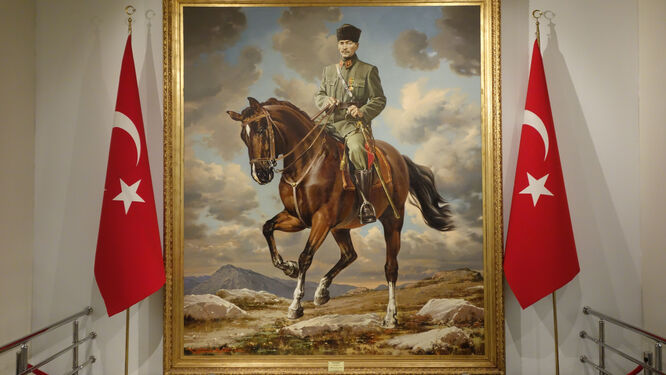Why Atatürk Matters
By Lale Surmen Aran and Tankut Aran
Visitors to Turkey are often surprised to find that there is one person the normally playful Turks will never, ever make fun of: Kemal Atatürk.
Considered the George Washington of the Turks, Atatürk almost single-handedly created modern-day Turkey from the battle-torn, corrupt, demoralized remnants of the Ottoman Empire. As the map of Europe was being redrawn at the end of World War I, this confident war hero put forth a clear and complete vision that persuaded the Turks, on the brink of an epic crisis, to forge a modern nation.
By the early 20th century, the Turkish people were in dire straits. After centuries of decline, the Ottoman Empire — known as the "Sick Man of Europe" — had allied itself with Germany, which eventually pulled it into World War I. But even as the Ottoman Empire floundered, a wily officer named Mustafa Kemal proved his military mettle, successfully defending Gallipoli with a handful of poorly equipped soldiers against a huge armada.
As the war came to an end, victorious European armies occupied Istanbul, planning to partition the former empire and dole out the pieces to their allies. In 1919, the Greeks took the city of İzmir (on the south coast of Turkey) and began pushing toward Istanbul. With lightning speed, the war hero Kemal gathered an army to defend Turkish territory. Over a three-year period (the Turkish War of Independence), he chased out French and Italian troops and repelled the Greek invasion. With the Treaty of Lausanne in 1923, the Ottoman Empire was history, the Turkish Republic was born, and Mustafa Kemal became the most beloved Turkish leader in centuries. The National Assembly elected Mustafa Kemal as the first President of the Republic, and dubbed him Atatürk — "Father of the Turks."
Rescuing his nation from the buffet line of European colonialism would have been enough, but Atatürk was far from finished. He envisioned a modern, progressive Turkey that would eschew the outmoded values of the Ottoman Empire in favor of real European-style democracy. Rarely in history has anyone exerted such power with such effect in so short a time. In less than 10 years, Atatürk...
- aligned Turkey with the West rather than the East
- separated religion and state (by removing Islam as the state religion and upholding civil law over Islamic law)
- adopted the Western calendar
- decreed that Turks should have surnames, similar to Western custom
- changed the alphabet from Arabic script to Roman letters
- distanced Turkey from the corrupt Ottoman Empire by abolishing the sultanate and caliphate, and outlawing the fez and veil
- abolished polygamy, and
- emancipated women (at least on paper).
Atatürk died at 9:05 on November 10, 1938 — and every year, all of Turkey still observes a minute of silence at 9:05 on that day to honor the man they regard as the greatest Turk. For a generation, many young Turkish women actually worried that they'd never be able to really love a man as they already had so much love for the father of their country. Because of Atatürk, today's 85 million Turks have a flag — and reason to wave it.
Lale Surmen Aran and Tankut Aran are the authors of the Rick Steves Istanbul guidebook.

